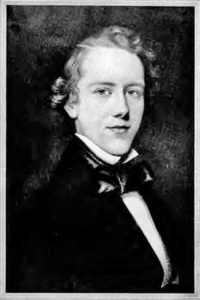
Hudson Taylor as a Young Man
Don’t you just love to see Christians who are radical for Jesus?
When everyone else seems to be going about a day-to-day existence, these forerunners are knocking down barriers, and hacking their way through the underbrush of new frontiers.
Such a man was Hudson Taylor, the missionary who spent his life pushing through the obstacles of China in order to take Jesus to the nation. And there were many obstacles indeed.
Born in England in 1832, Hudson was the son of a Chemist and lay preacher. His parents were devout Christians, but the young Taylor had little reverence for the faith as he was growing up. When he was 17, however, there was a dramatic change. A visiting evangelist shared some words which penetrated his heart, and Hudson gave his life to Christ.
Soon after, a missionary doing work in China struck another chord, and Hudson Taylor officially received the call of God on his life. From that first encounter with the missionary until the end of his life on earth, Hudson Taylor lived and breathed his call. To take the gospel of Jesus to the Chinese people.
Though he was still a young man, Hudson began learning Mandarin and began studying medicine so that he could use his skills to help his chosen people. At the age of 21, he set sail on the 5 month journey which would, through much turbulence land him at a treaty port in Shanghai, China.
At the time, there were only a couple of dozen missionaries in the entire country of China. But by the end of his life, Taylor had managed to bring more than 800 missionaries, establish 125 schools, and 300 work stations, and recruit 500 locals – with missions in every province of the great nation. His 51 years of service laid the foundation for evangelistic work which still goes on today. Upon his death, China was considered the hottest evangelistic field in the world and thousands of people were volunteering to be part of the mission.
Hudson Taylor was a radical believer. One of his famous quotes was,
“China is not to be won for Christ by quiet, ease-loving men and women. The stamp of men and women we need is such as will put Jesus, China, and souls first and foremost in everything and at every time. Even life itself must be secondary.”
So how was he so successful?
The few English missionaries who were in China when Hudson began his work, were worldly and haughty toward the local people. As a result, the Chinese didn’t trust them and often resisted their attempts to establish mission posts.
Hudson changed that. He dyed his hair black, shaved his forehead, and began wearing a pigtail just as the Chinese were doing. He dressed in Chinese garb. He rode in rickshaws just as they did. Of course, such drastic measures brought scorn from the other English people. But he was not deterred. His goal was to be as Apostle Paul in “being all things to all men that he may by all means save some.” (I Cor. 9:22)
And save some he did, but it wasn’t easy.
He boldly began traveling deeper into the interior of the continent. Risking danger and illness, he continued. With a medicine bag to help the people and tracts in Mandarin, Taylor pressed on with only a few people who would accompany him.
Over the years, Taylor endured much hardship. Many of the missionaries who came with him died or returned home discouraged. It was harder than they had imagined.
Several of Taylor’s children died from illness and his first wife died at the age of 33. Malnutrition and poor health conditions plagued him. Even Taylor experienced several bouts of illness requiring him to return to England for recovery.
Yet even those times were productive. He spent those years translating the Bible into Mandarin and speaking at churches throughout England. That’s when he would recruit new people to assist his mission. Taylor had founded the China Inland Mission to organize his efforts, and his passion aroused the help of many volunteers – and donations from those who couldn’t go.
People who joined his mission could be from any denomination, as long as they had faith in Jesus. Yet there were some strict guidelines. Holiness. of course, but more than that. They were to dress as the Chinese and they were to trust God for their own finances. The Mission did not pay salaries, so each person was on his own. They were also required to trust God for their safety. Even single women were sent alone into the interior – a dangerous place even for the burliest of men.
Over the 51 years that Hudson Taylor gave his life to the Chinese cause, there were about 18,000 Christian conversions. A few years after his death in 1905, the communist regime took over the nation and Christianity came under great persecution. However, the foundation which had been laid was still there – even if it had to go underground.
They tried to cut the tree down, but the roots were still there. In recent years, those roots have put forth shoots which continue to grow. The revival we see today in China is largely outgrowth from those roots.
The legacy of Hudson Taylor lives on.
His attitude also lives on today in the lives of the men and women who are willing to do what it takes in order for the Gospel to reach the unreached people of the world. To penetrate the 1040 window is no small feat, but it’s one which will change the course of the world.
The Gospel will be preached to all men, just as Jesus said it would.




















Recent Comments